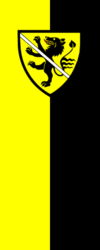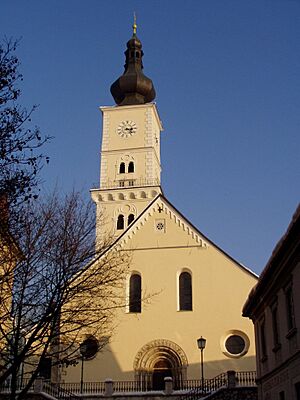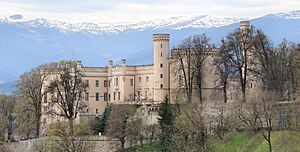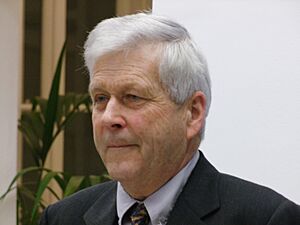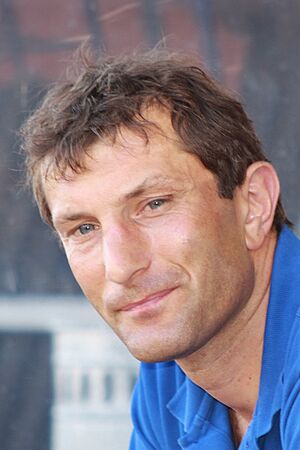Wolfsberg, Carinthia facts for kids
Quick facts for kids
Wolfsberg
|
|||
|---|---|---|---|
|
Municipality
|
|||
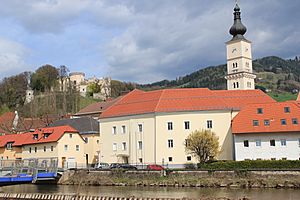
Riverside and Wolfsberg Castle
|
|||
|
|||
| Country | Austria | ||
| State | Carinthia | ||
| District | Wolfsberg | ||
| Area | |||
| • Total | 278.31 km2 (107.46 sq mi) | ||
| Elevation | 463 m (1,519 ft) | ||
| Time zone | UTC+1 (CET) | ||
| • Summer (DST) | UTC+2 (CEST) | ||
| Postal code |
9400
|
||
| Area code | 04352 | ||
| Website | www.wolfsberg.at | ||
Wolfsberg is a town in Carinthia, Austria. It is the main town of the Wolfsberg District.
Contents
Geography
Wolfsberg is located in a beautiful valley called the Lavant River valley. This river is a branch of the Drava River. The town is surrounded by mountains, including the Lavanttal Alps and the Koralpe range.
The town covers about 279 square kilometers (108 square miles). This makes it the fourth largest town in Austria by area. A road connects Wolfsberg to Voitsberg in Styria by going over the Packsattel mountain pass.
Wolfsberg is made up of many smaller areas. These include 40 "cadastral communities," which are like official land divisions. It also has 65 villages, each with its own population. Some of the larger villages include Auen, Gries, Kleinedling, Priel, and Reding.
History
The land where Wolfsberg is located used to belong to the Prince-Bishopric of Bamberg. This was a powerful church territory in the past. The castle above the town, called Wolfsperch, was first mentioned in a document from 1178.
The settlement next to the castle grew into an important center. In 1331, it was given "town privileges." This meant it could act more like a city, with its own rules and markets.
During the Protestant Reformation in the 16th century, a place called Bayerhofen Castle became a center for Lutheranism. This was a new Christian movement. However, the Counter-Reformation later stopped the spread of Lutheranism in the area.
In 1759, the Habsburg empress Maria Theresa bought all the lands in Carinthia that belonged to Bamberg. Wolfsberg Castle was later bought by Count Hugo Henckel von Donnersmarck in 1846. He rebuilt it in a special style called Tudorbethan, which looks like old English castles.
During World War II, a village near Wolfsberg called Priel was the site of a large prisoner-of-war camp. About 7,000 prisoners were held there. After the war, the British forces used it as a detention camp.
Twin towns
Wolfsberg has "twin town" relationships with other cities around the world. This means they share culture and friendship.
Notable people
Many interesting people have come from Wolfsberg:
- Michael Tangl (1864–1921), a historian who studied old documents.
- Christine Lavant (1915–1973), a famous poet and writer.
- Ulrich Habsburg-Lothringen (born 1941), a nobleman and politician.
- Erwin Friedrich Wagner (born 1950), a biochemist who studies cancer.
- Elisabeth Köstinger (born 1978), a politician.
Sport
Wolfsberg has also produced many talented athletes:
- Hubert Baumgartner (born 1955), a former football player and manager.
- Walter Kogler (born 1967), a football player and coach who played for the Austrian national team.
- Heinz Arzberger (born 1972), a football goalkeeper.
- Patrick Friesacher (born 1980), a racing car driver.
- Marlies Hanschitz (born 1986), a retired female footballer who played for the Austrian women's national team.
- Eva Wutti (born 1989), a triathlete and cyclist.
See also
 In Spanish: Wolfsberg para niños
In Spanish: Wolfsberg para niños


